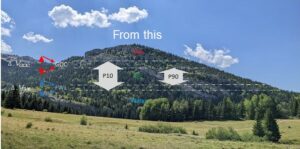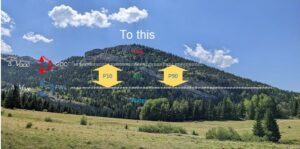14-23 May 2024
Event phone:
Event Information & Registration
Event Information
This event will be delivered online.
📅 Dates: 14 | 16 | 21 | 23 May 2024 (4 x 2hr sessions)
⏰ Time: 17:00-19:00 (UK time) per session
Registration
Please read our Registration Terms and Conditions before completing your purchase.
If you are interested in becoming a member of GESGB please visit the membership page HERE.
Course Description
GESGB Training Partner Programme (online) – What Is (the) Depth?
Facilitator: Harald Bolt, DwpD Ltd., Depth Solutions
Background and Objectives
Any discussion on subsurface geologies, reservoirs, fluid interfaces and production, invariably involves the term “depth”. While we usually take these “depth” values for granted – far more often than we expect – we run into issues that seem to be unsolvable due to 3D subsurface positional discrepancies. This course addresses this issue, introducing a novel approach to validating energy industry 3D position delivery against well specification requirements. Starting off with expectations and assumptions, we discuss definitions and then consider key concepts in tightening up depth value validity. This includes the accuracy of depth measurements and how this translates into the key concept of “depth” uncertainty. “Depth” is just one of three measurements used to determine 3D position. The 3D Way-point model for subsurface 3D positional description is discussed. This seemingly simplistic model allows complex calibration and observation accuracy, correction accuracy, and the accuracy of the measurement model, to be quantified and the 3D positional uncertainty determined. This approach allows both operators and service companies to design well survey programs and QA/QC so that pre-defined 3D positional uncertainties are achieved. This course reduces the occurrence of, and risks associated with, expensive issues due to discrepancies in “depth”.
Target Audience
Geologists, geophysicists, reservoir engineers, production engineers, drilling managers/superintendents, tool pushers, subsurface data analysists, (MWD & wireline) logging engineers, directional survey engineers, well planners, subsurface data analysists, asset managers.
Agenda
1. Talking About Depth
- What are “depth” expectations and how do these relate to subsurface information?
- Definitions and references
- Wireline and drill pipe – similarities and differences
- Calibration and verification of measurement
- Corrections
- “Depth” and the way-point model
- In: to tie-, or not to tie- …. ?
2. Creation of Accuracy
- Well depth uncertainty basics
- The fixed accuracy component of ToolJointError
- Variable accuracy components
- Depth measurement value uncertainty
- Applications and limits
- “Depth” uncertainty in service and operator organisations
3. The 3D Subsurface
- The use of well depth, inclination, and azimuth
- Calibration and correction components
- Minimum curvature and 3D Way-point calculation
- Way-points and interval length considerations
- Model expectations and limitations
4. Uncertainty in 3D
- 3D positional uncertainty expectations
- The Milking Chair principle
- Calibration, correction, and model-fit accuracies
- ToolJointError in 3D
- Way-points, the transform, and arriving at 3D uncertainty
- Variables that affect uncertainty outcomes
- Design factors for well survey programs and QA/QC
- 3D uncertainty in service and operator organizations


Fig. 1 – The effect of managing 3D uncertainties
Facilitator Biography
Facilitator: Harald Bolt, DwpD Ltd., Depth Solutions
Harald Bolt started work in the ‘80’s in the oil&gas sector as a logging engineer. As of his very first job he started thinking about “depth”. He has since developed the way-point depth measurement principle, this applied to wireline as well as drill pipe. This principle has been developed through to 3D positional determination and uncertainty. Clients include North Sea, GoM, Middle East, and Far East.
He is a member of the GESGB, EAGE, SPE, SPWLA and ISCWSA. He has authored and presented numerous papers on well depth and 3D positional determination and uncertainty. He holds 1 EU and US patent and 1 patent applied for relating to well depth and 3D positional and uncertainty determination based on way-point.
Venue Information
Venue information
Venue name:
Online
Venue address:
This event will be delivered online.

